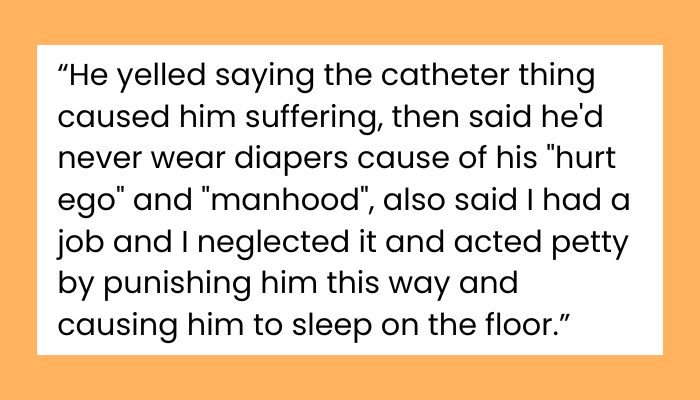I Refused to Clean the Bed He Slept on the Floor. Am I the Monster?
OP (F34) has been with her husband (M32) for years, and their life together has taken a difficult turn due to his serious heart condition. She’s not just a wife anymore — she’s become a full‑time caregiver, nurse, housekeeper, and emotional shock absorber. One of his medications causes excessive urination, which has led to nightly bedwetting episodes. That was manageable when he had a catheter, but her husband decided to have it removed, even against medical advice. Since then, bedwetting has become a regular part of their nights.
Doctors suggested adult diapers as a less invasive solution, but he refused — says it hurts his ego, makes him feel less of a man. So instead of trying that solution, he continues to wet the bed and expects OP to get up and clean it all — we’re talking mattress, sheets, floor — even at 2AM. She’s done this more than 40 times. She’s exhausted. On the most recent night, she finally hit her limit and didn’t get up when he shouted. He ended up sleeping on a spare mattress and told her she was heartless.
Her husband even brought in his sister to scold OP, saying her “attitude” was unacceptable and her husband is helpless. Now OP wonders — is she the AH for finally saying no?
It’s easy to stand by your partner when everything is smooth sailing, but the real test comes when health issues and caregiving strain you in ways you never anticipated

The author’s husband, who had heart problems, relied on her for cooking, cleaning, medication supervision, and other daily care
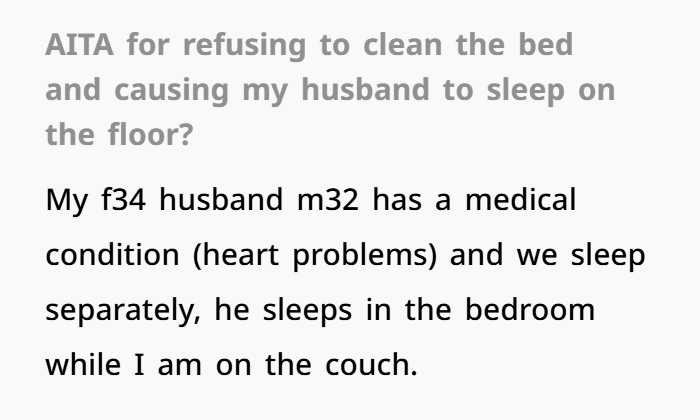
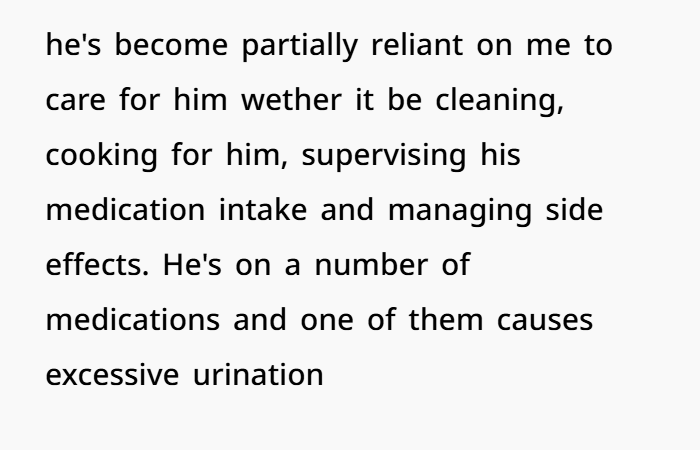
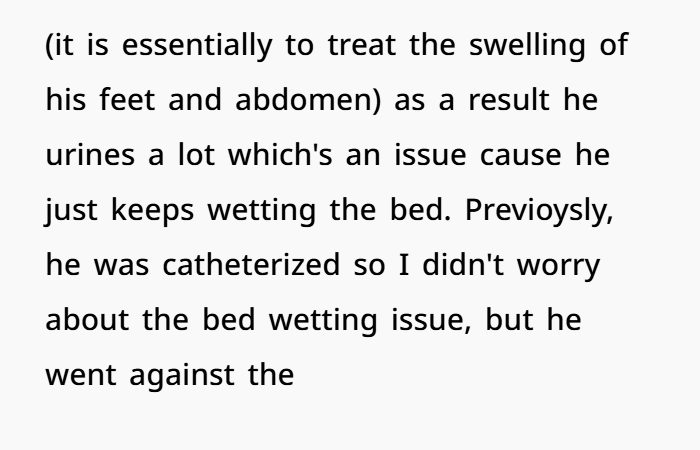
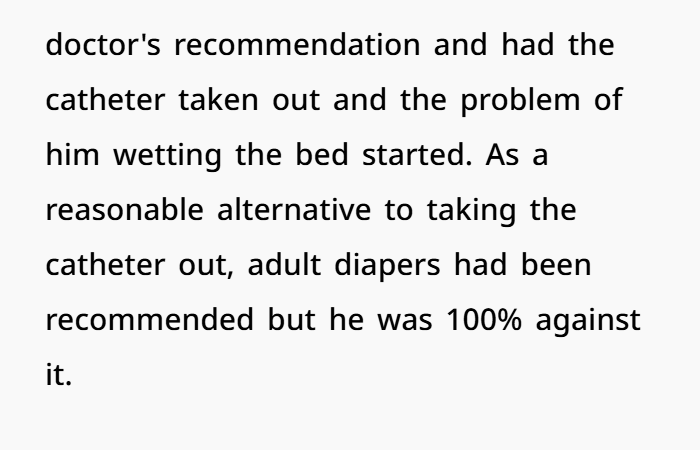
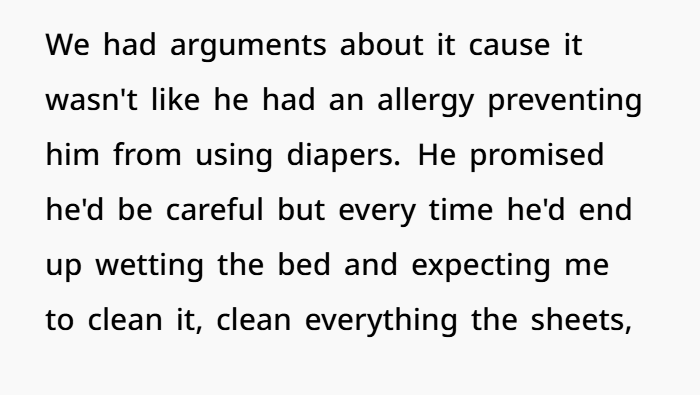

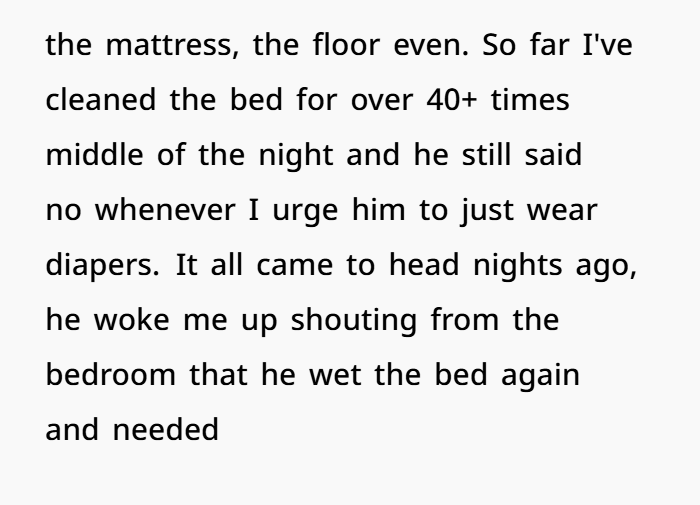

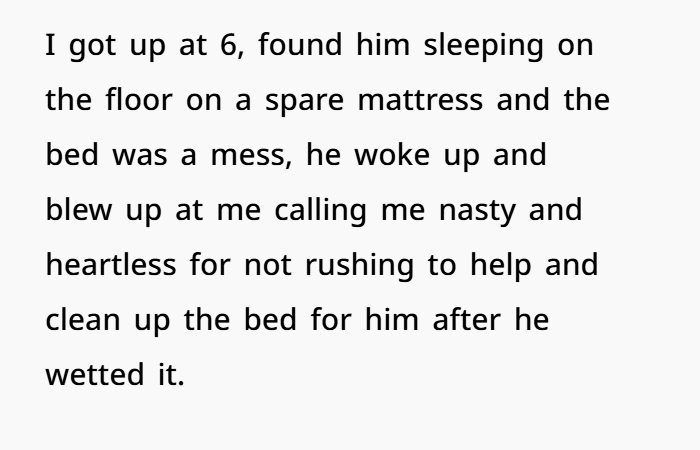
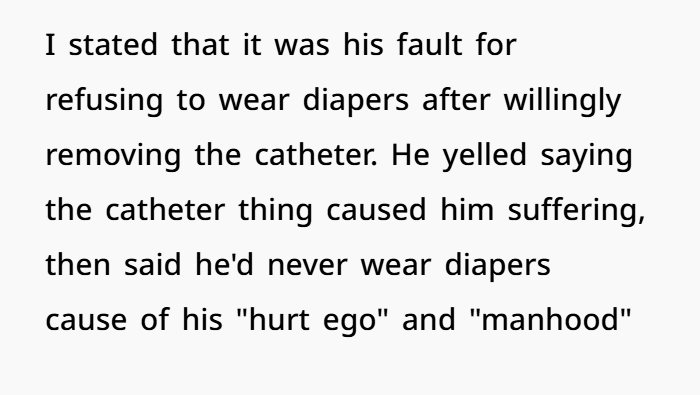
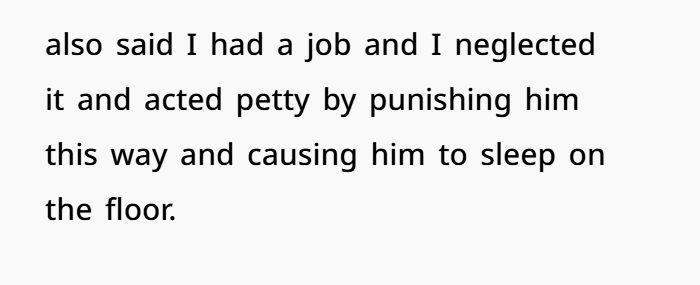
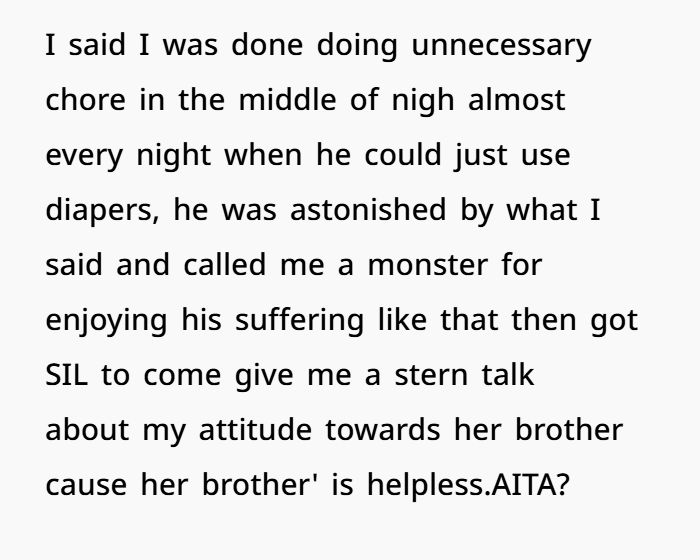
Let’s just be real: when your partner gets sick — really sick — you end up playing nurse, chef, cleaner, emotional support system, and everything in between. It’s not just “helping out,” it becomes a full-time mental and physical load. And if you’re doing all that on top of being disrespected or ignored, you’re going to break. This isn’t just about a wet bed. This is about a relationship dynamic that’s turned into something completely unfair and unsustainable.

1. What is caregiver burnout and why it matters
You might be surprised how common this situation is. Caregiver burnout affects millions of people — especially women — who are looking after sick spouses, elderly parents, or children with special needs. According to the Cleveland Clinic, caregiver burnout is a state of physical, emotional, and mental exhaustion that may be accompanied by a change in attitude — from positive and caring to negative and withdrawn. It’s not just tiredness. It’s overload. (clevelandclinic.org)
Signs of burnout can include:
- Feeling drained even after sleep
- Feeling like your help is taken for granted
- Increasing resentment
- Constant guilt for setting limits
In this story, OP has been doing nighttime laundry for months, barely sleeping, and now she’s being yelled at for not springing out of bed at 2 a.m. for the 41st cleanup. That’s not just inconvenient — that’s unsustainable.
2. The cost of ignoring medical advice
Let’s not overlook that OP’s husband removed his catheter against medical advice and then refused the alternative (diapers). This isn’t about him being helpless. He had options. Options given by medical professionals to manage his condition and preserve his dignity. But instead, he chose pride over practicality.
His refusal isn’t just a personal decision — it has a direct, burdensome impact on his wife. His “manhood” doesn’t get to override her right to sleep, peace, and health. Wearing adult diapers isn’t shameful. It’s a responsible health decision. Denying them while expecting others to clean up? That’s entitlement.
3. When emotional labor becomes exploitation
It’s one thing to help someone. It’s another to be treated like staff. OP isn’t a nurse being paid to do overnight clean-ups. She’s a wife. A partner. And while “in sickness and in health” is a vow that means something, it doesn’t mean “do everything for me while I ignore solutions and demand more.”
Let’s call it what it is: when someone repeatedly refuses reasonable alternatives and demands you take over the mess they caused, that’s emotional labor turning into exploitation. It’s the same dynamic you see when women are expected to “just handle” everything quietly because that’s what good wives do.

This isn’t about a single incident. This is about a pattern. And when OP finally said no, she wasn’t being cruel — she was reclaiming a boundary that had been disrespected for months.
4. The guilt trip and family triangulation
Another red flag? His sister getting involved. That’s what’s called “triangulation” in psychology — when someone brings in a third party to reinforce their side of a conflict. It can feel like emotional manipulation. Instead of understanding OP’s exhaustion, her husband painted her as the villain to his family, reinforcing her guilt and isolating her emotionally.
5. Why boundaries aren’t cruelty
Here’s the truth: saying no doesn’t make you a monster. It makes you human.
Healthy relationships require mutual respect, shared responsibility, and clear communication. Saying “I won’t get up at 2 a.m. to clean pee every night” isn’t petty. It’s drawing a line. It’s saying: “I love you, but I also need to function.”
He had options. He made his choice. And now he’s angry at the consequences of that choice. That’s not on you. That’s on him.
6. What can be done instead? Practical tips
Let’s say OP still wants to help (which she clearly does, otherwise she’d be long gone). Here are some reasonable steps they could take:
- Waterproof mattress protector: Non-negotiable. Saves the mattress and reduces cleanup.
- Absorbent pads: Disposable bed pads (like Chux pads) can go on top of sheets and be tossed easily.
- Night alarms: Bladder alarms can alert to urination early.
- Medical revisit: If the catheter or diapers aren’t an option, maybe there’s a better medication solution. But that’s on him to pursue.
- Outside help: If he needs full-time care, maybe it’s time to look into home health support. Expecting one person to do everything isn’t fair.
Netizens sided with the author, emphasizing that her husband’s refusal to use adult diapers or manage his own bedwetting was unfair and exhausting
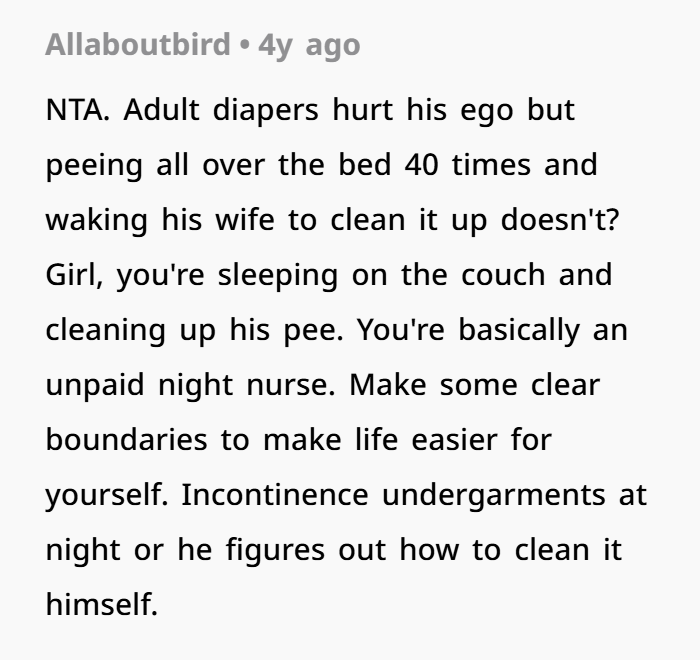
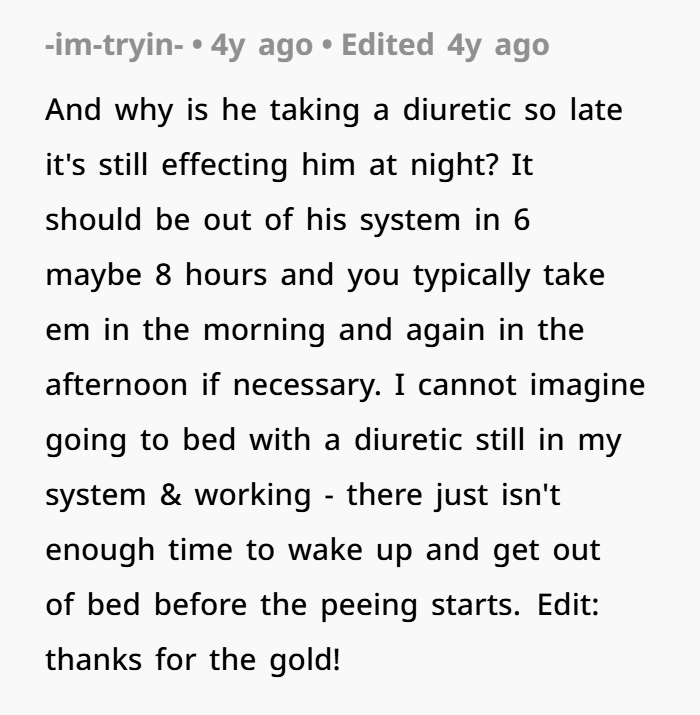
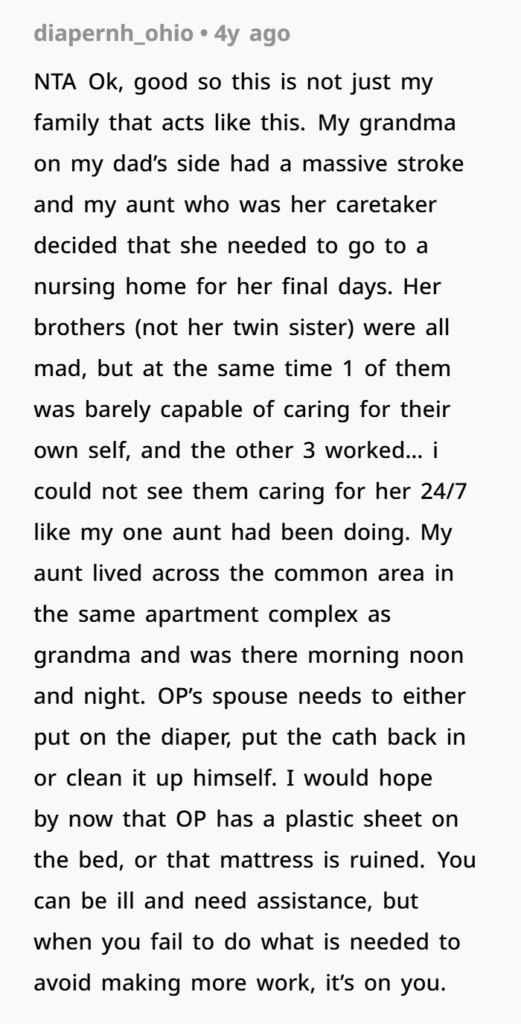
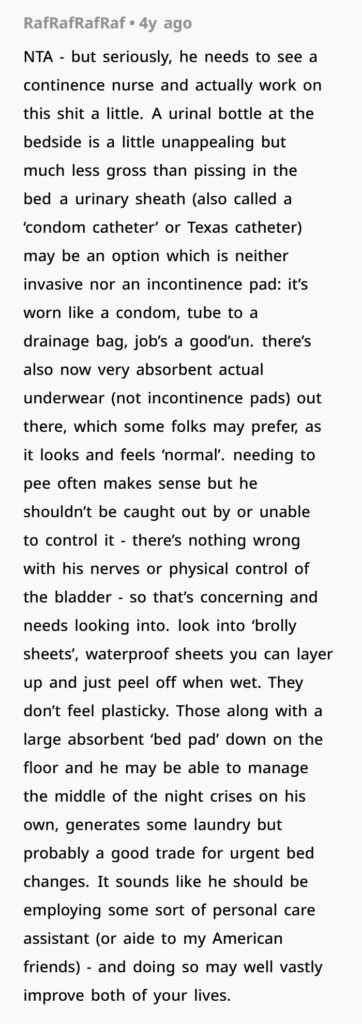
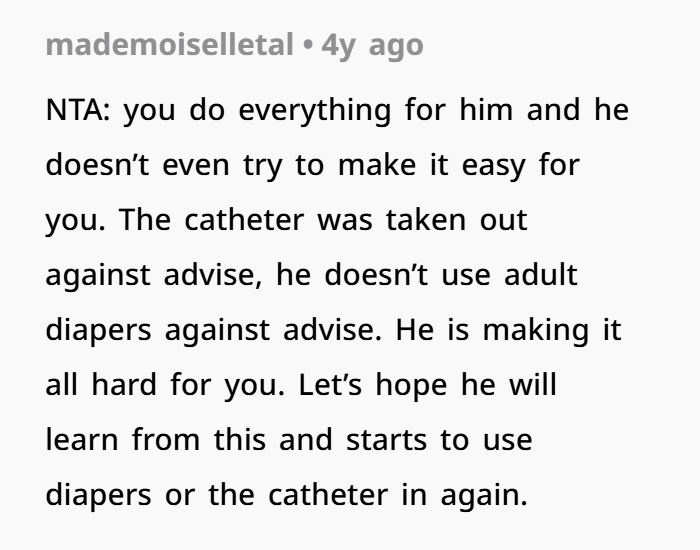
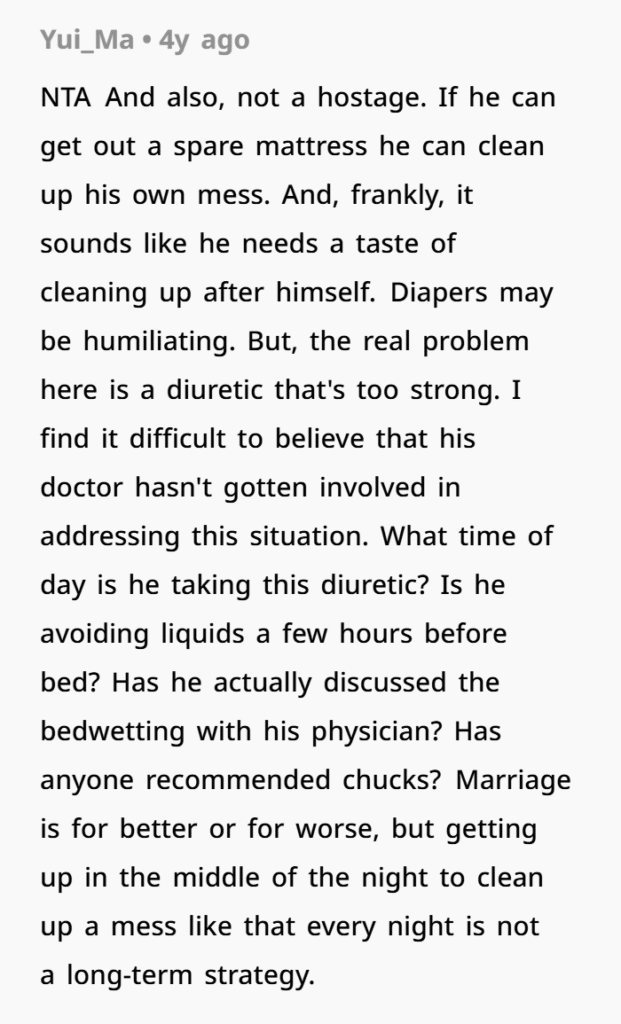
You’re NTA. You’ve gone above and beyond. You’ve cleaned, cared, and stayed compassionate. You asked for one simple thing — that your partner take some responsibility for a preventable problem — and he refused.
He chose pride over practicality, and now he’s angry at you for finally saying “I can’t anymore.” That’s not heartless. That’s honest. It’s okay to stop when your tank is empty. You’ve earned the right to sleep, to rest, to not be the 24/7 cleanup crew.

